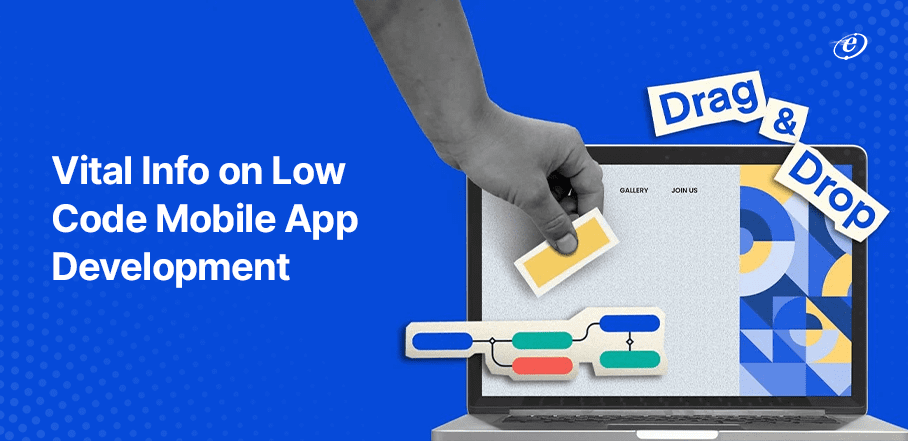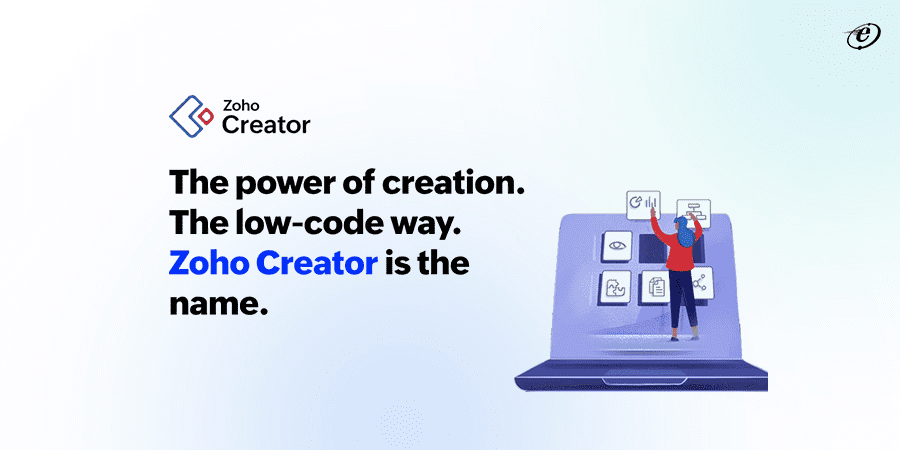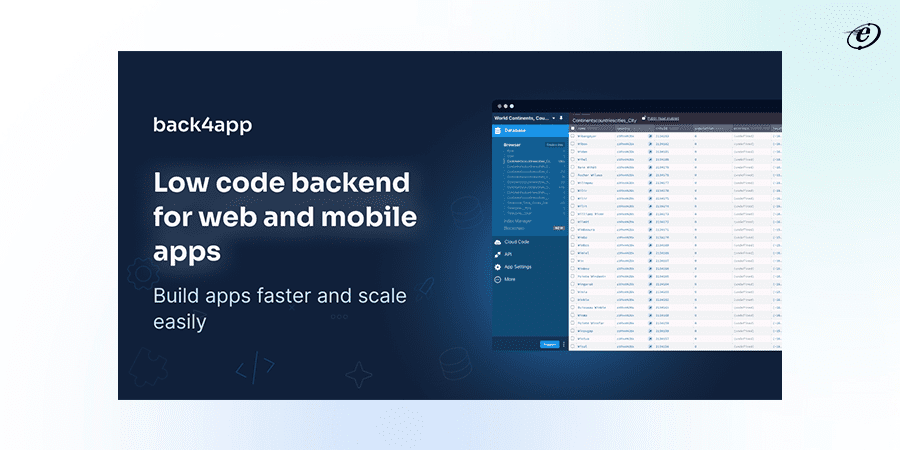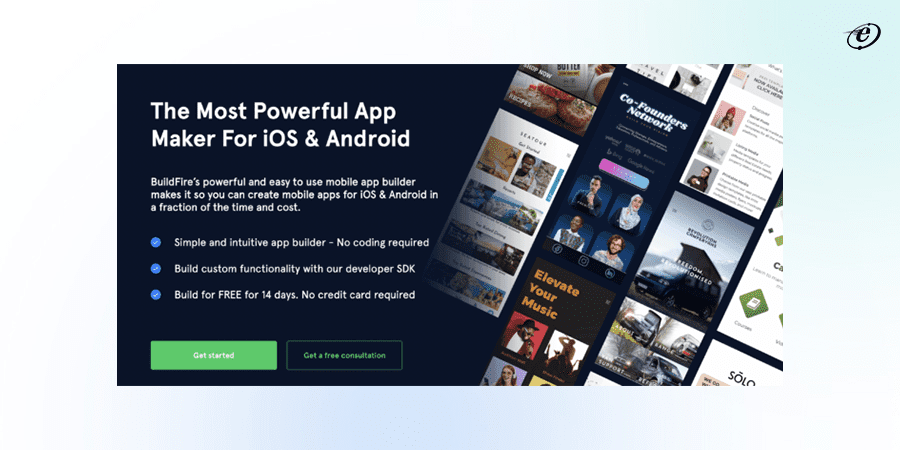Imagine creating an application by using simple drag-and-drop functions and an intuitive GUI. Low code mobile app development makes such a simple development process a reality.
By 2024, you can witness the low code development platform reach around USD 32 billion. The reasons behind the growing popularity of low code platforms for mobile development are simple – fast development speed, high flexibility, and minimal risks.
Choosing a suitable low code mobile app development platform can offer such evident benefits if you are a business.
This blog aims to introduce the intriguing concept of low code development. In addition, you can find some handy options to start your next project and build mobile apps using the low code no code mobile app development strategy.
So, choose a suitable low code platform for featuring on several mobile devices!
What is Low Code Mobile App Development?
Let us understand the concept of low code in depth.
How do developers build a mobile or web application?
Well, they understand your requirements and write pertinent codes using an apt programming language.
Then, the designers develop various UI/UX elements using further coding. So, it is a no-brainer that you require thorough technical knowledge of computer and software engineering for building high-quality websites, portals, and applications.
However, with technological progress, low code no code mobile app development came into existence.
As the name suggests, you can use a mobile application development platform consisting of visual tools to create a fully functional app with a low code approach. It is possible to develop, test, and troubleshoot web apps using ergonomic low code platforms for mobile app development.
So, choosing low code development tools with robust security features is now vital for augmenting your web services.
Examples: Microsoft Power Apps, Zoho Creator, Mendix, etc.
A Quick Look at No Code Development
Staying on the same course, you should be aware of the ‘no code’ concept.
In no-code development, you can choose existing designs to build a web or mobile application. There is no need to have any detailed knowledge of coding.
Users like you can change the interface of progressive web apps by using the available features on the no-code development platform.
Examples: Bubble, Zapier, Softr, FlutterFlow, etc.
What are Benefits of Low-code Mobile App Builders?
You must be thinking, ‘If traditional coding produces exceptional results, why prefer the low code approach to create mobile apps?’ Well, there are many advantages to choosing this app development strategy. In this section, you can explore each benefit in detail.
High Level of Flexibility
You can use the low code mobile app development process to create apps without any intricate technical knowledge.
Some basic know-how of coding is sufficient to utilize this approach and feature in various app stores. The ability to use drag-and-drop features and leverage simple platform visuals leads to a high level of flexibility. As a result, you can design apps for various operating systems with ease.
So, mobile application development platforms and all the tools that are available can boost your productivity.
Improved Productivity
You can create apps without deploying complex code instructions with a low code mobile app development platform.
This simplicity for creating hybrid mobile apps enables an increased level of productivity. In less time, you can build more apps or features to intrigue the target audience.
Better Risk Management
Do you know why low code platforms for mobile app development are gaining more popularity?
One of the main reasons is the ability to manage risks in an efficient way. These platforms are continually undergoing continual improvement. As a result, you can handle any bugs at a faster pace.
Also, since the features are simple and require minimal coding, troubleshooting becomes straightforward.
High Cost Effectiveness
Anyone with fundamental coding knowledge can capitalize on low code mobile app development. So, the reliance on dedicated coders is low.
This advantage leads to savings in costs incurred for hiring technical professionals. Even if you have a skilled developer, he or she can leverage low code platforms and design customized apps at a faster rate.
Fast Pace of Development
With the help of low code mobile app development, you can develop apps at a fast pace. Eliminating in-depth technical coding enables any user to build apps from scratch. Cool, isn’t it?
Well, with this approach, you can delegate tasks to your team without any contemplation. Remember, low code apps launch at a faster rate in the market. So you can gain an edge over your competitors.
Top Low-Code Mobile App Development Platforms
There are many low code platforms for mobile app development in the market. In this section, you can browse the top five choices and choose a suitable app building platform.
1. Zoho Creator 
Main highlights:
| Language | Deluge |
| Prominent Clients | Audible, Sony, Whirlpool |
| Number of Apps | Over 7 Million |
| Official Website | https://www.zoho.com/creator/ |
You can build apps across several platforms with the help of Zoho Creator. This low code mobile app development platform has pre-defined templates to enable quick initialization of work.
Here are some of the main pointers of Zoho Creator:
- Mobile SDK and UI kit
- In-built integration creator
- Artificial Intelligence creator
- Third-party integration
With these evident benefits, it becomes easier for enthusiasts like you to create apps of high caliber.
To get a complete understanding of this platform, note down these pros and cons:
| Pros | Cons |
| Easy to use | Comparatively steep learning curve |
| High customization options | Customer service can be a hassle |
| Good integration | Account level settings limitations |
| Ergonomic user interface | Challenges with API integration |
2. Back4App
Main highlights:
| Type | Open Source |
| Prominent Clients | 1001Dubai, VantageBP, Two4Tea |
| Pricing Plans | Free to USD 400/month |
| Official Website | https://www.back4app.com/ |
To choose a low code mobile app development platform for backend purposes, this option can prove worth exploring.
This open-source platform can help build your API from scratch. What’s more? It is easier to develop extensible solutions without a vital need for maintenance.
Take a look at some of the main aspects of Back4App:
- Presence of REST API tools
- Email marketing automation
- Existence of live queries
- Role-based access available
To understand the utility of Back4App even more, consider the following pros and cons:
| Pros | Cons |
| Good documentation | Comparatively outdated interface |
| Support for GraphQL | Limited student plans |
| Ability to run cloud code | Cloud code only in JavaScript |
| Robust database backup | Limited support videos |
3. BuildFire
Main highlights:
| Main Language | JavaScript |
| Prominent Clients | AMMA, HVTV, NowRise |
| Extensibility | iOS, Android, PWA |
| Official Website | https://buildfire.com/ |
If you want to try an all-in-one low code mobile app development platform, BuildFire is a good choice. You can use the drag-and-drop features of this app builder and experience a fast turnaround time.
Here are some of the main highlights of BuildFire to consider:
- Built-in feature library
- Deployment management system
- In-built app development templates
- Live reporting and analytics
Furthermore, it has certain unique advantages that can persuade you to explore the features. Here are the pros and cons in a nutshell:
| Pros | Cons |
| High customization options | Comparatively high pricing |
| Easy to use | Lack of global support |
| Comparatively simple learning curve | Platform can feel slow |
| Good development experience | Limited customer service |
4. Mendix
Main highlights:
| Language | React and React Native |
| Prominent Clients | Continental, AI Baraka Bank, Erie Insurance |
| Number of Apps | Over 235,000 |
| Official Website | https://www.mendix.com/ |
One of the most popular low code platforms for mobile app development, Mendix is a worthy option. It has several tools to encourage budding developers to explore their creativity.
If you want to understand the main aspects of Mendix, just note these four points:
- Intelligent automation
- Seamless data integration
- Common visual language
- Dedicated Mendix Marketplace
Mendix is suitable for low code no code mobile app development, especially for large-scale enterprises.
To know more, take a look at the main pros and cons:
| Pros | Cons |
| Fast development speed | Comparatively expensive |
| Regular updates | Low entry threshold |
| All-inclusive lifecycle management | Scope of improvement for portal development |
| Free version is available | Requirement of custom code layer |
5. Microsoft Power Apps
Main highlights:
| Language | Power Fx |
| Prominent Clients | Certas Energy, WHO, Bank of Israel |
| Premium Pricing | USD 20/month for one user |
| Official Website | https://powerapps.microsoft.com/en-us/ |
Last but not least, Microsoft Power Apps is a well-known low code app development platform. There are three types of Power Apps that you can explore – Canvas, Model-driven, and Power Pages.
So, compared to some other low code platforms for mobile app development, this option offers more features to develop high-quality mobile and web apps.
Take a look at some of the notable facets of MS Power Apps:
- Dataverse security roles risk assessment
- In-built app templates
- Integrated AI builder
- Microsoft 365 Integration
One more tip. Knowing the differences between Mendix and Power Apps can help you decide the best choice for your project.
Coming back to the MS Power Apps information, the pros and cons can help you make a wise decision:
| Pros | Cons |
| Easy to use | Limitation on reusability |
| Integration with Microsoft products | One user can operate MS Power Apps at a time |
| Ability to capitalize dataverse | No console logging |
| Good customer support | Lack of customization |
The Limitations of Low Code Mobile App Development
By now, you might be thinking – ‘let me buy a low code mobile app development platform right away!’
Well, yes, the prospect can seem favorable. However, we would also want you to know the downsides of this development strategy. Here are some main pointers that explain the limitations of the low-code approach:
- Less Unique Attributes: Think about it. You use a platform with in-built templates to design a mobile app. Similarly, another company uses the same platform to develop its site. The features will lead to the generation of similar visual elements. So, the customization will have some limitations
- Decent Learning Curve: Yes, low code development platforms do not need extensive coding knowledge. But you still need to get familiar with the functions, drag-and-drop process, and other elements
- Limitations During Integration: It can be challenging to integrate low-code apps with your existing systems. So, to overcome this limitation, read the APIs that you receive with low-code platforms
- Challenges During High Loads: Suppose your website has an overload of users. Such a scenario can cause performance issues as low-code apps or platforms do not have a high level of scalability
So, when choosing low code platforms for mobile app development, think from all perspectives. Always select options that allow scalability and offer a decent software infrastructure.
When in doubt, you can consult dedicated developers. These professionals will suggest the best approach after assessing your business requirements.
Start Your Low Code Mobile App Development Today!
In a nutshell, low code is a modern approach to developing web or mobile apps. By using in-built templates, drag-and-drop features, and other functions, you can build applications at a fast pace.
What’s more? Low code mobile app development platforms enable developers to initiate rapid deployment. Mendix, Zoho Creator, BuildFire, and Power Apps are excellent platforms for this strategy.
However, along with the advantages, low code development has some limitations. The apps can look similar if you utilize the same platform. In addition, low-code apps can find it difficult to handle heavy user demand.
In such cases, it is essential to contact skilled and experienced developers. So, if you want to explore low code platforms for mobile app development, contact us today!
Excellence-driven professional with 15+ years of experience in increasing productivity, and revenue, while effectively managing products of all sizes. He has worked for international clients in the US, UK, and Singapore and local companies in various domains. With excellent attention to detail and a methodical approach to execution, he is an expert in bringing projects to a successful stage. He follows James Humes’s famous saying- “The art of communication is the language of leadership.”















